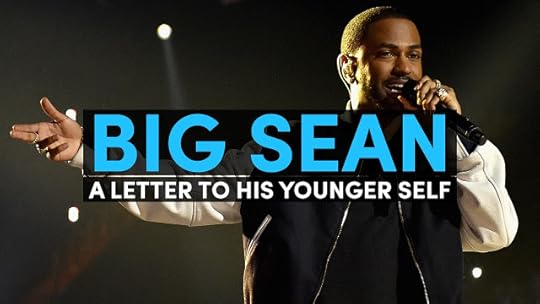Mark Anthony Neal's Blog, page 536
February 12, 2017
Look to the Rainbow: Remembering Al Jarreau
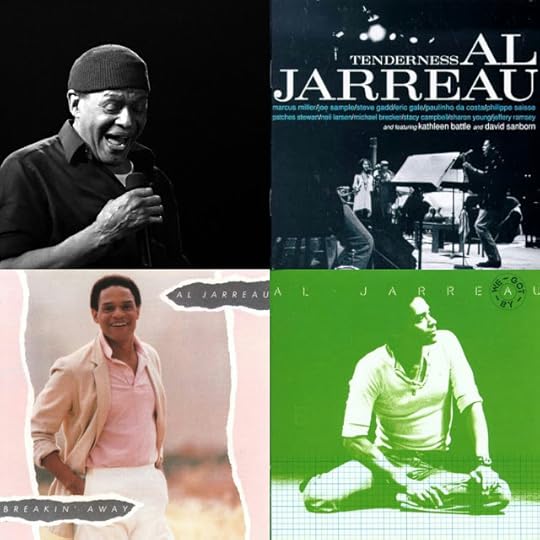 Look to the Rainbow: Remembering Al Jarreauby Mark Anthony Neal | @NewBlackMan | NewBlackMan (in Exile)
Look to the Rainbow: Remembering Al Jarreauby Mark Anthony Neal | @NewBlackMan | NewBlackMan (in Exile)I suspect for much of the mainstream, there are two moments for which Al Jarreau’s music most resonates: the theme to Moonlighting, the mid-1980s television series which starred Cybill Shepherd and introduced the world to Bruce Willis, and his breakthrough hit “We’re in this Love Together.” Trust that someone will describe Mr. Jarreau, on the occasion of his death, as a “one-hit” wonder, which may be more apropos than most fans would admit, in spite of his seven Grammy Awards. Mr. Jarreau was that something more elusive than stints on the Pop charts; for more than 40 years Mr. Jarreau danced on the margins of Jazz, R&B and Pop to create a career that was as unique as his vocal style -- a style which might be best described as fits of facial contortion and spastic movements embodied in the finest of vocal improvisational skills.
Mr. Jarreau was born in Milwaukee in 1940 and was a working professional in San Francisco when he began to gig on the side with a young George Duke in the late 1960s. By the end of the that decade Mr. Jarreau decided to pursue his career as a jazz vocalist fulltime, finally releasing his first studio album, the now iconic We Got By in 1975.
Anchored by the title track and tracks like “Susan’s Song,” We Got By fell right in place alongside recordings like Phoebe Snow’s self-titled debut, the work of Jon Lucien, and even Paul Simon’s Still Crazy After All These Years, which acknowledged the world of soft rock, yet knowingly gestured to a popular Jazz vocal tradition. The same can be said about Mr. Jarreau’s follow-up’s Glow (1976) and All Fly Home (1978), which featured fine cover of Elton John’s “Your Song,” The Beatles “She’s Leaving Home,” the original “Milwaukee” (from Glow) and “I Do.”
Mr. Jarreau might have been remembered as a fine interpreter and improviser, had Warner Brothers not chose to capture part of his 1977 European tour and release it as a live double album, Look to the Rainbow. The album, which featured a vocal version of the Jazz standard “Take Five,” as well as a Leon Russell cover (“Rainbow in Your Eyes”), and a striking rendition of his own “We Got By” (which serves as closer), earned Mr. Jarreau his first Grammy Award in 1977 for Best Jazz Vocal Performance.
With the success of Street Life (1979) by The Crusaders, which more intentionally engaged the mainstream R&B and Funk of the late 1970s and featured vocals by future collaborator Randy Crawford, Mr. Jarreau’s fourth studio album reflected a glossier more urbane sound -- and it was his most successful album to date, with the single “Never Given’ Up” becoming his first top-ten R&B hit. It was with that momentum that Mr. Jarreau recorded what remains his most successful album Breaking Away, which topped the R&B and Jazz album charts and was his only top-10 Pop album. Perhaps taking a page from Grover Washington’s collaboration with Bill Withers on “Just the Two of Us” Breakin’ Away’s breakout hit was the lilting Pop ditty called “We’re in This Love Together” which found Pop favor amidst the death of all things Disco and the rumblings of New Wave; the album earned Mr. Jarreau the Grammy for Best Male Pop Vocal Performance in 1982.
“Mornin’” -- the kind of song that morning drive-time DJs and programmers still love -- became Mr. Jarreau’s second major pop hit with the release of his 6th studio album Jarreau (1983). Mr. Jarreau even managed to have his version of the “Big 1980s Pop Ballad” with “After All” (High Crime, 1984), though Mr. Jarreau’s Pop success was largely behind him. The “Moonlighting” Theme (1987), which was produced by Nile Rodgers, was Mr. Jarreau’s last Pop hit, though ironically “So Good,” which appeared on Heart’s Horizon the next year, was his highest charting R&B song.
For the next two decades Mr. Jarreau would continue to make fine records, pivoting more towards the so-called Smooth Jazz sounds -- that arguably he, the late Grover Washington and Patti Austin were responsible for incubating -- and touring profusely throughout the globe. Mr. Jarreau won his last Grammy Awards in 2007, at age 66, for a duet project with legendary guitarist George Benson, including the Best Traditional R&B Performance for “God Bless the Child” which featured Jill Scott.
While Mr. Jarreau’s studio albums are indeed a tribute to his art and career, the many who were fortunate to hear him live, where album cuts like “Roof Garden” (Breakin’ Away) became tour-de-force performances, know that there was so much more. Folks would do well to track down a copy of Casino Nights, recorded live in Montreux, where Mr. Jarreau and Randy Crawford trade bars on tracks like “Who’s Right, Who’s Wrong” and Marvin Gaye and Tammi Terrell’s classic “Your Precious Love.” And if there might be a way to bookend Mr. Jarreau’s genius, it would be 1977’s Look to the Rainbow and his 1994 live gem Tenderness, which may also serve as the best introduction to his talents.
Yet there are other obscure moments; Mr. Jarreau remixed with the late Phife on “In My Music” from Tomorrow Today (2000) or his joining forces with the late Kashif to celebrate summers in Edgartown. Vocally, Mr. Jarreau was a reminder that Doug E Fresh, Biz Markie, Dianne Reeves, Erykah Badu and yes, Lil’ Wayne did not occur in a vacuum, as Mr. Jarreau himself was indebted to Billie Holliday, Ella Fitzgerald, Lambert (Dave), Hendricks (John) and Ross (Annie) and Louis Armstrong.
Mr. Jarreau’s commitment to always take the music to the people -- wherever the people may be -- might be his lasting testament; Mr. Jarreau was on-tour, literally until days before his death.
+++
Mark Anthony Neal been conjuring analog for a digital world for a minute; Check him at @NewBlackMan + @LeftofBlack + BookerBBBrown on the ‘Gram + and the homebase at NewBlackMan (in Exile).
Published on February 12, 2017 18:56
A New Strategy for Reparations
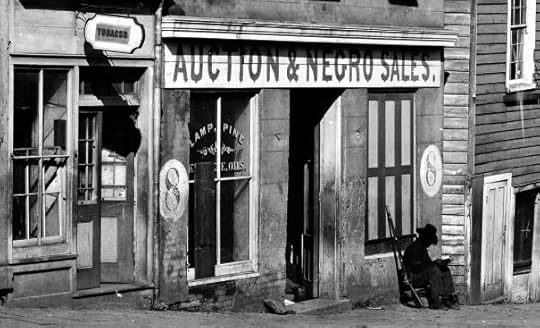 A New Strategy for Reparationsby Charles Bane, Jr. | special to NewBlackMan (in Exile)
A New Strategy for Reparationsby Charles Bane, Jr. | special to NewBlackMan (in Exile)During the election of 2016, no Presidential candidate, Democrat or Republican, addressed directly the issue of Reparations, just as no candidate had the courage to admit that police killings of unarmed Black males was evidence of an impulse to murder in which all Caucasian are complicit.
The Republican Party now seems hell bent on rolling back the enfranchisement of African Americans, and is in multiple ways, hostile to the aspirations and concerns of the minority community.
Equally, it would be foolhardy to ignore the ability of this powerful party to advance a primary goal of Black America as national Republicans desperately seek ( misguided) ways to attract ethnic voters.
African Americans are alone. They have always been alone. Both Democrats and Republicans have left them so. Democratic statements and photo ops are fractionally comforting to families whose loved ones- cherished, looked up to, and promising- were cut down by police revolvers.
There are two favorite games in Washington: one is the pretense that the budget must be balanced. The other game is the more deceptive of hiding a pea beneath a shell so that favorite programs can be financed without appearing as direct taxation.
The cause of Reparations can be comfortably adopted by a party determined to balance ledgers even as its hypocrisy continues unabated in its fundamentally racist outlook.
Call a Republican a racist. He bridles and sputters. Why, his is the party of Lincoln. He does not, he says, see color ( a lie, of course). But this expedient soul may be induced to engage in one - upmanship with the Democrats he utterly loathes on even so costly an initiative as Reparations if the pea can be hidden under a large shell. And Democrats as a result will be put on notice that actions are what matters, not words.
Would ( I won't call him President) Trump sign such a sweeping bill? I believe he would for two reasons: he needs the approval of Congressional Republicans of his extreme measures and in the back of his mind, knows they are essential to staving off charges of corruption. Secondly, he is so unknowing of racial issues he may believe he is executing nothing extraordinary. He cannot discern differences because he doesn’t study or even read memos. He may repeat that "Frederick Douglass is doing a good job." And for once he would be right.
+++
Charles Bane, Jr. is an author and activist currently at work on a biography of Martin Luther King, Jr.
Published on February 12, 2017 06:24
February 11, 2017
“I can’t be overdrawn, I still have some checks”: 'Baduizm' at 20
 “I can’t be overdrawn, I still have some checks”: Baduizm at 20by I. Augustus Durham | @imeanswhatisays | NewBlackMan (in Exile)
“I can’t be overdrawn, I still have some checks”: Baduizm at 20by I. Augustus Durham | @imeanswhatisays | NewBlackMan (in Exile)With understandable teenage angst, I commenced sixth grade. As vividly as that memory remains, I remember preparing for school one morning as 94.3 WYBC provided the soundtrack for my dressing, when “On & On” premiered. No different than when I first heard D’Angelo’s “Brown Sugar”, the record conjures, hypnotizes. There is no other way to explain it but to say: when you first heard that beat drop—bum bum bu bu bu bu bum boom bap—it was as if the video’s juke joint was your bedroom.
Yesterday was Leontyne Price’s 90th birthday and the fact that Baduizm turns 20 years old today, following that nonagenarian milestone, seems more than coincidental when considering an admonition from Price to “sing on your interest, not your capital.” What Baduizm exhibits, to my mind, is that choice.
From start to finish, what jives about the project is its immense black cool, that being Badu performs with a level of ease suggestive that what has been rumored about her eyes translates to her vocal chords: they have special powers. To sing her interest on Baduizm is a calculation which forces listeners to divine what being born underwater with three dollars and six dimes signifies when you play the game of love with a 3000-aire. That maybe we’ll be butterflies—that sounds so divine!—if we run in fields of 4-leaf clovers. That Tyrone has a ho(e) and he takes it everywhere he goes, planting his seed so he reaps what he sows, you know? You know . . .
An archival singer, à la Mark Anthony Neal, Badu cobbles together what one surmises is a greatest hits of the black aesthetic tradition, manufacturing what Hortense J. Spillers refers to as speaking a truer word concerning herself by coining a new term, a self-named –izm which some may deem an illness and still others would call da illest. Whether signposting The Color Purple; having Stevie Wonder paraphernalia, in the form of vinyl, strewn throughout a loft space shared with an educated brother complexly occupied; gesturing to afrofuturism in Motherland 3037 a.d. before we knew the discursive portmanteau was something we had already seen; sampling a Starr in the Atlantic; certainly channeling Billie Holiday and/or Chaka Khan to “Stay” with us for a little while longer; or beckoning “Ye Yo”, “the Black mother within each of us—the poet—[who] whispers in our dreams: I feel, therefore I can be free” (Audre Lorde, “Poetry is Not a Luxury”)—she is a tour guide, a syllabus for the self-determining, a playbill for the drama to which one pays to listen.
The inability to be overdrawn, to still have some checks, proves the existence of capital, cultural and otherwise, such that she lives off the interest. Expendable income made hand over fist. The black cool of Baduizm is that it does not register as work but rather wonder, a marveling at music insofar as although once metered, lined, by maroons, those sounds encounter reinterpretation by the woman who calls herself “the moon”. Yet the album shows only one side of the self. The other side momentarily emerges some 11 years subsequent to Baduizm bowing on to the charts when Badu screams that with age comes understanding game theory. This performance, this convening of chuch—the heavy breathing, often called whooping, that occurs simultaneous to the choir of background singers who comprise the AMEN corner—, allows one to behold what happens when what you do gets good to you, when your song for others transforms to be the testimony of I. The agency to provoke a sonic séance in 14 tracks evokes what may be the album’s subliminal message—despite external forces, you, and who you define yourself to be, is enough—and lends a perspective to what it means to capitalize on that very thing that elicits interest.
Baduizm, as an object of work, is a poorly placed designation: perhaps it is an opportunity for wisdom, an occasion to witness, an obligation to word flesh. A consideration to badu oneself and make one’s own baduizm. To speak one’s name, from verb to noun.
***
I. Augustus Durham (ABD) is a fifth-year doctoral candidate in English at Duke University. His work focuses on blackness, melancholy and genius.
Other essays from I. Augustus Durham:
How “Black” Is Your Science Fiction?
KING Me: Soul for a Black Future
Mr. White! *said in echo*: Charting the Black(ness)
Published on February 11, 2017 11:17
February 10, 2017
#ProjectBronx: Is Rioting Un-American?
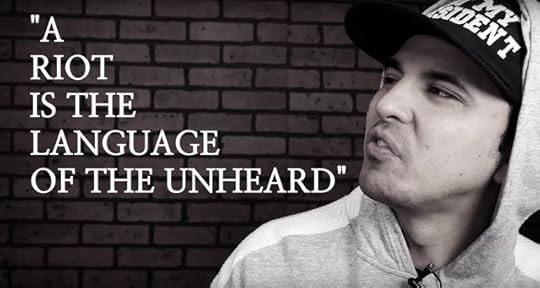 'In the Wake of Trump - this is an argument about Protesting vs Rioting, and it's correlation to American History.' -- +ProjectBronx
'In the Wake of Trump - this is an argument about Protesting vs Rioting, and it's correlation to American History.' -- +ProjectBronx
Published on February 10, 2017 20:05
Maya Angelou: And Still I Rise [Trailer]
 'Journey through the prolific life of Maya Angelou, the I Know Why the Caged Bird Sings author and activist, who inspired generations with lyrical modern African-American thought. Features new interviews with Oprah Winfrey, Common, the Clintons and others.'-- +PBS
'Journey through the prolific life of Maya Angelou, the I Know Why the Caged Bird Sings author and activist, who inspired generations with lyrical modern African-American thought. Features new interviews with Oprah Winfrey, Common, the Clintons and others.'-- +PBS
Published on February 10, 2017 19:22
Big Sean: A Letter to My Younger Self
Published on February 10, 2017 19:16
Cyber Racism + Mental Health + Teens of Color
 'Racist bullies have moved from schoolyards to smart phones and computer screens—and it's taking a heavy toll, especially on black youth.' -- +Fusion
'Racist bullies have moved from schoolyards to smart phones and computer screens—and it's taking a heavy toll, especially on black youth.' -- +Fusion
Published on February 10, 2017 19:09
The Color of Love: Black Brazilian Families
 'Can the racial features of a child impact the way a parent loves and disciplines him or her? How does racial stigma play out in an Afro-Brazilian family, where one child can be born with a darker skin tone than another? Dr. Elizabeth Hordge-Freeman, Assistant Professor of Sociology with a joint appointment in the Institute for the Study of Latin America and the Caribbean at The University of South Florida, Tampa, tackles these very questions in her latest book,
The Color of Love: Racial Features, Stigma, and Affective Capital in Black Brazilian Families
.'
'Can the racial features of a child impact the way a parent loves and disciplines him or her? How does racial stigma play out in an Afro-Brazilian family, where one child can be born with a darker skin tone than another? Dr. Elizabeth Hordge-Freeman, Assistant Professor of Sociology with a joint appointment in the Institute for the Study of Latin America and the Caribbean at The University of South Florida, Tampa, tackles these very questions in her latest book,
The Color of Love: Racial Features, Stigma, and Affective Capital in Black Brazilian Families
.'
Published on February 10, 2017 18:58
Carrie Mae Weems: Cornered [video]
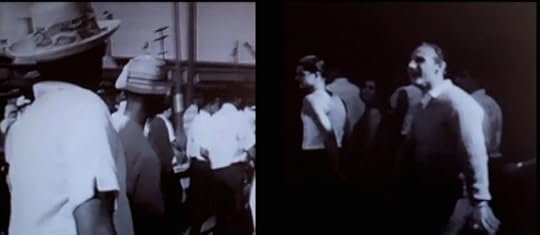 'Carrie Mae Weems Cornered consists of two video screens that converge and show two lines of protest made up of pro and con de-segregationists responding to Boston’s 1965 Racial Imbalance Act. On each side is one key figure that taunts the other with stare-downs and dares. The only sound is Samuel Barber’s Adagio for Strings, which greatly enhances the viewer’s already heightened alarm. Since you cannot hear what they are saying you are left to imagine their words and thoughts, making this gut-wrenching scene even more turbulent.' -- +Carrie Mae Weems
'Carrie Mae Weems Cornered consists of two video screens that converge and show two lines of protest made up of pro and con de-segregationists responding to Boston’s 1965 Racial Imbalance Act. On each side is one key figure that taunts the other with stare-downs and dares. The only sound is Samuel Barber’s Adagio for Strings, which greatly enhances the viewer’s already heightened alarm. Since you cannot hear what they are saying you are left to imagine their words and thoughts, making this gut-wrenching scene even more turbulent.' -- +Carrie Mae Weems
Published on February 10, 2017 18:49
What Video Games Teach Us About U.S. Anti-Establishmentarianism
 'What’s common to most movements of dissent, is that they don’t stay pure for long. Art curator and cultural critic Nato Thompson uses gaming to show how the anti-establishment ethos within those games has been commandeered by the very thing it sought to stick it to: “the man”. The same goes for big corporations like Coca Cola and Apple, who position themselves as the ordinary human. Institutions use dissenting art and culture to ensure profits. “The spirit of anti-establishment gets into the establishment,” says Thompson, and he perceives that as a broad phenomenon. Nato Thompson’s most recent book is Culture as Weapon: The Art of Influence in Everyday Life'-- +Big Think
'What’s common to most movements of dissent, is that they don’t stay pure for long. Art curator and cultural critic Nato Thompson uses gaming to show how the anti-establishment ethos within those games has been commandeered by the very thing it sought to stick it to: “the man”. The same goes for big corporations like Coca Cola and Apple, who position themselves as the ordinary human. Institutions use dissenting art and culture to ensure profits. “The spirit of anti-establishment gets into the establishment,” says Thompson, and he perceives that as a broad phenomenon. Nato Thompson’s most recent book is Culture as Weapon: The Art of Influence in Everyday Life'-- +Big Think
Published on February 10, 2017 18:35
Mark Anthony Neal's Blog
- Mark Anthony Neal's profile
- 30 followers
Mark Anthony Neal isn't a Goodreads Author
(yet),
but they
do have a blog,
so here are some recent posts imported from
their feed.


